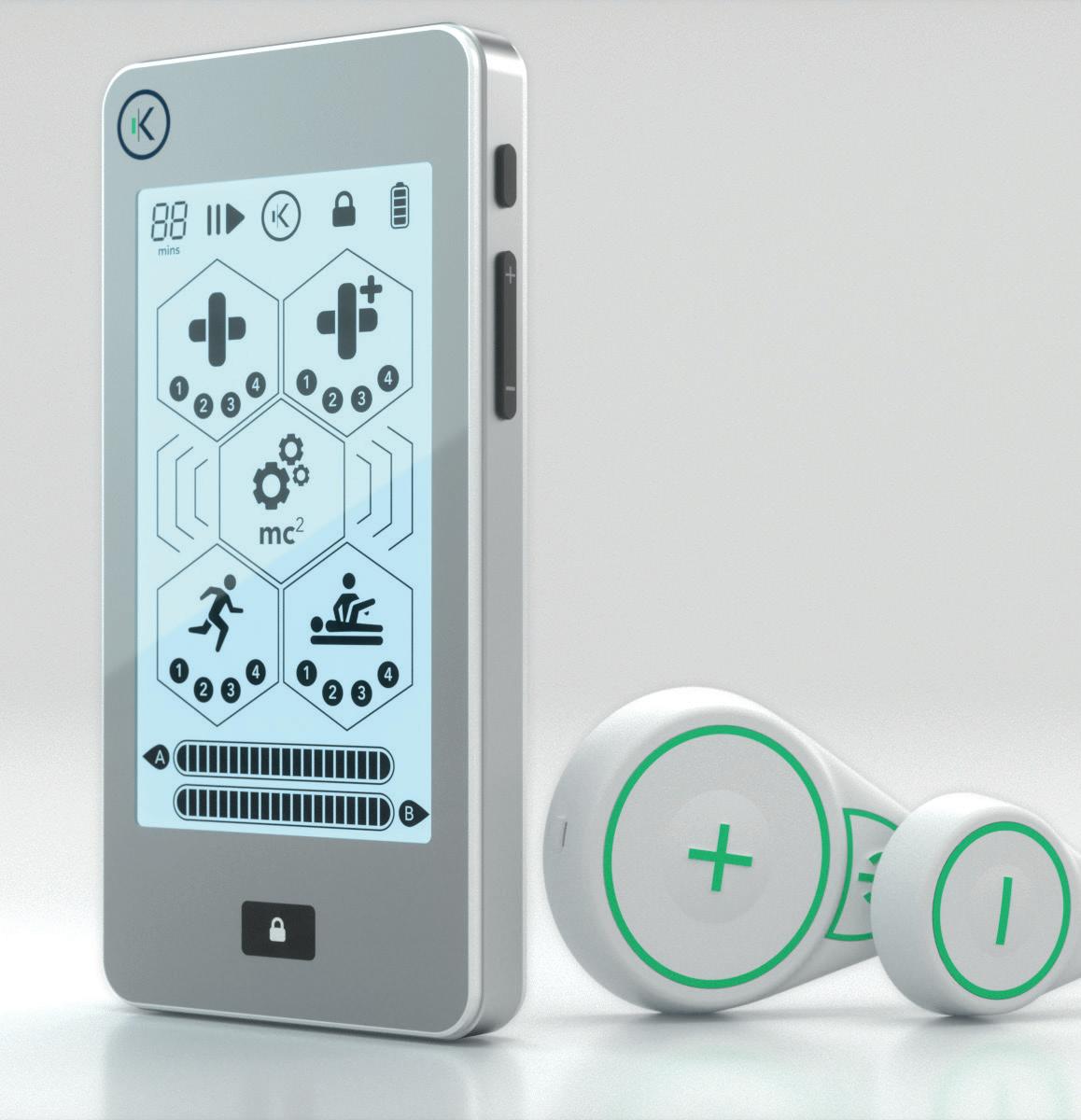Chronic Diseases
Q4 2022 | A promotional supplement distributed on behalf of Mediaplanet, which takes sole responsibility for its content


“The programme provides two structured visits to the practice nurse and two visits to the GP every year.”
Dr Orlaith O’Reilly, the Integrated Care Programme for the Prevention & Management of Chronic Disease Page 02
Janis Morrissey, Irish Heart Foundation Page 04
www.healthnews.ie
“Early detection and management of cardiovascular risk factors are essential.”
A few ways to help you manage chronic migraine
Chronic migraine is a highly disabling neurological condition that can have a huge effect on everyday life, preventing patients from being able to do day-to-day tasks.
Chronic migraine is defined as a headache present 15+ days per month, which represents the majority of patients attending the Headache Clinic. The mental health implications can be severe with chronic migraine but finding a way to manage your condition is key. One way to do this is ‘pacing.’
Understanding pain
Pain is a hugely emotional experience as well as a physical sensation. Many thoughts can increase our pain experiences such as anger, frustration, guilt, despair, anxiety and hopelessness.
Some people with ongoing pain tend to avoid physical activity altogether, whereas others may push through the pain and overdo it. This can result in a pain flare-up. By self-managing your pain, the focus is not on your body, it is on ‘you’ instead.
What is pacing?
‘Pacing’ self-management means adapting your situation to live a more fulfilled life despite pain. Self-management is not a replacement for medication, though many find they can reduce their medication.
Pacing involves commencing a daily activity routine, given your current level of fitness and pain. That is easily achievable by doing a little bit, but more often. This results in improvements to help you to become more active and healthy. The idea is to break the brain’s association between a particular movement and the fear that it results in pain.
How to start pacing
• Firstly, talk to your doctor to explore ways to get moving again.
• Start slow; a small amount of regular activity is better than overdoing it.
• Gradually increase activity daily; increase by 10% weekly, if comfortable for you.
• Pace activity over a realistic timeframe.
• Stick to your chosen timeframe no matter how good you feel.
• Add in a rest period.
• Record progress in a diary.
• Keep a pain-free diary, to train your brain to expect less pain.
Consistency is key, and this doesn’t mean that you won’t have bad days, but it’s about looking for that shimmer of light on darker days.
Providing care as close to home as possible: structured chronic disease management

In line with Sláintecare, the Structured Chronic Disease Management Programme (CDM) in general practice is enabling the delivery of person-centred care for chronic conditions as close to home as possible.
The CDM programme provides a structured management programme in general practice for people who are at risk of, or have a diagnosis of, cardiovascular disease, COPD, asthma and type 2 diabetes. It focuses on disease prevention, patient empowerment, early diagnosis and intervention and the provision of care.
A structured approach to care
The programme provides two structured visits to the practice nurse and two visits to the GP every year. Part of the HSE’s Enhanced Community Care programme is helping over 230,000 people with chronic diseases to avoid hospitals and stay well at home. It is available to patients aged 18 years and above who have a medical card or GP visit card.
Delivering person-centred care


The programme emphasises lifestyle and medical risk factor control, disease management and the creation of a patient care plan. The GP works with the patient to identify what matters most to them in managing their chronic conditions to develop a care plan and achieve their goals.
Helping patients live well and manage their chronic conditions is at the heart of the CDM programme, and a wealth of resources are being rolled out across Ireland. For example, 30 new cardiac rehabilitation teams and 30 new pulmonary rehabilitation teams are
being established in communities across Ireland to support patients following a heart attack or COPD admission.
Demonstrating a positive impact HSE published that since the inception in January 2020, 91% of GPs have signed up to deliver the programme. Patient uptake has been positive with 75% of the eligible population enrolling within the first 20 months of its rollout.
Addressing risk factors for chronic diseases — such as obesity — is an essential component. The initial report indicated that GPs delivered over 200,000 weight interventions to patients in the first 20 months of the programme. The cohort of patients’ average weight decreased by 1.5 kg between the first and third visit to their GP.
Award-winning programme
The CDM programme won an international award from the United Nations Interagency Taskforce in 2021, in recognition of its contribution to the prevention and control of chronic disease in Ireland. The HSE remains committed to the delivery of this seminal programme in general practice.
02 READ MORE AT HEALTHNEWS.IE AN INDEPENDENT SUPPLEMENT FROM MEDIAPLANET WHO TAKE SOLE RESPONSIBILITY FOR ITS CONTENT MEDIAPLANET
Dr Orlaith O’Reilly National Clinical Advisor, Group Lead for Chronic Disease & the Integrated Care Programme for the Prevention & Management of Chronic Disease
Eileen Hopkins Professional Psychotherapist, Life Coach & Public Speaker
Information provided by Esther Tomkins, Clinical Nurse Specialist, Headache Clinic, Beaumont Hospital. The Migraine Association of Ireland run three free courses per year on self-management for chronic migraine. For more information, contact us at info@migraine.ie
Project Manager: Kate McSwiggan kate.mcswiggan@mediaplanet.com Business Development Manager: Samantha Taylor Managing Director: Alex Williams Head of Ireland: Ross Bannatyne | Head of Print & Design: Thomas Kent Designer: Aimee Rayment Content Editor: Angelica Hackett O’Toole | Head of Digital Operations: Harvey O’Donnell Paid Media Manager: Jonni Asfaha Social & Web Editor: Henry Phillips Digital Assistant: Carolina Galbraith Duarte All images supplied by Gettyimages, unless otherwise specified | Contact information: uk.info@mediaplanet.com or +44 (0) 203 642 0737
@HealthnewsIE @MediaplanetUK Please recycle
or type 2 diabetes, ask your GP about
Scan the QR code to access the information leaflet.
If you are diagnosed with cardiovascular disease, COPD, asthma
the programme.
Know the symptoms of PBC and why it’s important

The symptoms of primary biliary cholangitis (PBC) may not immediately make you think of liver disease — but early diagnosis is crucial.
Early diagnosis can help patients with the chronic liver condition Primary Biliary Cholangitis (PBC) avoid further complications. Symptoms of PBC include itchiness — particularly on the hands and feet — fatigue, loss of concentration and poor memory. It can be debilitating for people with this condition that can have a severe impact on their quality of life.
Routine blood test
WRITTEN BY Mark Nicholls
Many patients will be unaware they have PBC until it is diagnosed via a routine blood test. Early diagnosis is crucial because the condition can become serious and may even require a liver transplant in severe cases.
Consultant Hepatologist at St Vincent’s Hospital Dublin, Dr Omar Elsherif, explains that PBC is an autoimmune condition where the body’s immune system mistakenly attacks the bile ducts, leading to liver damage and reduced bile flow.

“Half of the patients will not have symptoms, and it may only be picked up during a routine liver blood test or blood tests for another reason with their primary care physician who might find an abnormality and steer them to a liver specialist,” he continues.
Aggressive disease
Younger patients tend to have more aggressive disease. Emphasising that lifestyle is not a factor in PBC as it is caused by individuals developing antibodies to a protein in their liver, he says geographical clusters have been identified but with no environmental trigger highlighted. Currently, PBC affects around 40 people in 100,000, which amounts to 1–2,000 in Ireland — many of whom are undiagnosed.
Treatment available
More women affected PBC is almost nine times more common in women than men, but we are seeing increasing numbers of men diagnosed with the disease. “It tends to be diagnosed in women over 50, but we are now seeing younger women present with PBC,” says Dr Elsherif. “Those diagnosed under the age of 50 also have more severe disease that is more likely to result in liver damage. A minority will need a liver transplant. Women in their 30s and 40s can present with a quite severe disease which, if untreated, can have an impact on their quality of life and their life expectancy.”
Treatment for PBC typically involves life-long treatment with tablets. Dr Elsherif believes PBC is being more frequently diagnosed but urges patients to visit their GP for a blood test if they are worried that they may have PBC. “The earlier you start treatment, the more effective it is,” he adds.
Manageable condition
Dr Elsherif says it’s important to realise that PBC is a manageable condition. “People should not suffer with the symptoms that are affecting their quality of life — particularly an itch — because we have very good therapies to control it,” he adds.
MEDIAPLANET READ MORE AT HEALTHNEWS.IE 03 AN INDEPENDENT SUPPLEMENT FROM MEDIAPLANET WHO TAKE SOLE RESPONSIBILITY FOR ITS CONTENT
Paid for by Advanz Pharma
Find out more at pbcfoundation.org.uk
Dr Omar Elsherif Consultant Gastroenterologist & Hepatologist, St. Vincent’s University Hospital, Dublin
PBC is almost nine times more common in women than men, but we are seeing increasing numbers of men diagnosed with the disease.
This article has been organised and funded by ADVANZ Pharma UK & Ireland Limited. IE/NPR/NP/0003 December 2022
Janis Morrissey Director of Health Promotion, Information and Training, Irish Heart Foundation

One in four women die from heart disease or stroke, yet many women do not realise they are at risk.
According to the Lancet, cardiovascular disease in women is under-researched, underdiagnosed and under-treated; and women are underrepresented in clinical trials compared to their male counterparts.
Effects of oestrogen decrease on heart health
The risk of heart disease and stroke increases for everyone as they age. But for women, the years around menopause are an important time to care for your heart health due to changes in hormones, primarily the decrease of oestrogen. Oestrogen helps to protect women by keeping the blood vessels flexible and helping maintain healthy cholesterol levels. When this protection is lost, some risk factors for cardiovascular disease increase. This can result in the stiffening and weakening of the blood vessels, increased cholesterol, increased blood pressure and changes in body shape, weight, muscle and fat stores. These changes occur often alongside common menopause symptoms like hot flushes, night sweats, vaginal dryness, fatigue, depression and anxiety.
Simple routes to a healthy lifestyle
A total of 4,145 women died from cardiovascular disease in Ireland last year, making women six times more likely to die from heart disease and stroke than breast cancer. Early detection and management of cardiovascular risk factors are essential if we are to improve women’s heart health
Almost one-third (30%) of


and reduce early deaths in women. According to research carried out by Ipsos MRBI on behalf of the Irish Heart Foundation, almost one-third (30%) of women do not feel they have enough time to focus on their health every day.
The good news is that 80% of premature heart disease and stroke is preventable through changes to your lifestyle. Most women already know what makes a healthy lifestyle, but the many demands of modern life can get in the way. Some ideas include trying to manage stress, starting a conversation with your healthcare provider, exercising regularly and maintaining a healthy, balanced diet.
Learn about health in your own time
The Irish Heart Foundation’s Her Heart Matters website www.herheartmatters.ie provides useful resources for women looking to implement small, sustainable changes to their lifestyle to safeguard against cardiovascular disease, including a free self-care and wellbeing journal, personal experiences of living with heart disease and stroke and a self-assessment quiz.
04 READ MORE AT HEALTHNEWS.IE AN INDEPENDENT SUPPLEMENT FROM MEDIAPLANET WHO TAKE SOLE RESPONSIBILITY FOR ITS CONTENT MEDIAPLANET
need to take stock of their heart health, as their risk of heart disease and stroke rises as they move through menopause.
Women
One in four women die from heart disease or stroke: how to prevent it
women do not feel they have enough time to focus on their health every day.
DO YOU NEED TO LEARN MORE ABOUT ATRIAL FIBRILLATION OR STROKE?
•
Atrial fibrillation or AF is the name for a particular type of irregular heartbeat. An irregular heartbeat is often called an arrhythmia
With AF, your heart beats in a disorganised and irregular way which can lead to a range of symptoms and potential complications.
What are the symptoms of AF?
Some people have no symptoms of AF and are only diagnosed at a routine check-up with their doctor. Other people feel their irregular heartbeat straight away through a range of symptoms such as:
Palpitations
• Tiredness or weakness
• Difficulty exercising
• Dizziness, light-headedness or fainting
• Chest pain
• Discomfort or difficulty breathing
• Shortness of breath
What are the treatments for AF?
There are several medicine and non-medicinal options available to help manage your AF. There are two main strategies to control your irregular heartbeat: rate control or rhythm control. Some people may also be prescribed anti-thrombotic medication known as blood thinners. Ask your doctor if you would like more information.
Can I make any lifestyle changes that may help with my AF?
• Be active. Check with your doctor or nurse what a safe and reasonable level of activity or exercise is before you start.

• Ask your doctor, nurse or pharmacist for advice on what types of food to eat. You should do this especially if you take anticoagulant tablets by mouth, as some food and drink can affect the way your tablets work.
• Avoid stimulants such as caffeine in coffee or alcohol and nicotine from smoking. These can trigger an irregular heart rate.
• Have your blood pressure and cholesterol monitored regularly and keep them under control.
• Reduce stress and find ways to manage or control any stress you cannot avoid.
• Go for regular check-ups. They will help you maintain your quality of life.
MEDIAPLANET READ MORE AT HEALTHNEWS.IE 05 AN INDEPENDENT SUPPLEMENT FROM MEDIAPLANET WHO TAKE SOLE RESPONSIBILITY FOR ITS CONTENT
Making lifestyle
There are two main strategies to control your irregular
or
HARV will bring you on an immersive 360 journey through your body Date of Preparation: April 2021 PP-ELI-IRL-0486 www.atriajourney.ie USE THE QR CODE TO FIND OUT MORE DISCOVER IT NOW ON WWW.ATRIAJOURNEY.IE It could make all the difference Content is taken from the Irish Heart Foundation Live Well With Atrial Fibrillation Patient Information Booklet, scan the QR code to access.
changes to help manage atrial fibrillation
heartbeat: rate control
rhythm control.
Diabetes mellitus is a lifelong condition that can be diagnosed at any age and is caused by an absence or insufficiency of insulin.
Insulin is a hormone made by the pancreas. It regulates the level of glucose (sugar) in the body. With diabetes, the pancreas makes too little insulin (or none) to enable all the glucose in your blood to get into your muscle and other cells to produce energy. If glucose can’t get into the cells to be used, it builds up in the bloodstream. Therefore, diabetes is characterised by high blood sugar (glucose) levels.
Types of diabetes
There are many types of diabetes, but the three main types are:
• Type 1 diabetes: always requires treatment with insulin injections or via an insulin pump. It is known as an autoimmune condition where the body’s immune system destroys the insulin-making cells (beta-cells) of the pancreas. It can occur at any age.
• Type 2 diabetes: usually develops slowly in adulthood. It is progressive and can sometimes be treated with diet and exercise; but more often, type 2 diabetes may require medications and/or insulin injections.
• Gestational diabetes: occurs during pregnancy but usually disappears when the baby is born. Women diagnosed with gestational diabetes are at a higher risk of developing diabetes at a later stage.
Main differences: type 1 and type 2
The main difference between both types is in causes and treatments. In type 1 diabetes, insulin is not produced, and insulin therapy is required from the start. In type 2, insulin is produced but the body does not use it properly, so the treatment focuses on managing glucose levels through lifestyle and/or medications.
Prevalence in Ireland
We do not have a diabetes register in Ireland, but it is estimated that up to 300,000 people live with diabetes in Ireland — of those, approximately 261,300 live with type 2. Type 2 is the most prevalent chronic condition in people between 45–75 years old; and according to a recent 2021 Healthy Ireland survey, it is expected that the number of people with type 2 diabetes will increase by 60% over the next 10–15 years.
Understand your chronic pain and seek help when needed
Chronic pain, unlike acute pain, persists beyond the normal time of healing; this is generally accepted as pain that lasts longer than three months.
There are many causes of chronic pain such as an illness or injury from which you recover, but the pain remains. The International Association for the Study of Pain (IASP) redefined pain in 2020 as “An unpleasant sensory and emotional experience associated with, or resembling that associated with, actual or potential tissue damage.”
Types of chronic pain
Chronic primary pain represents chronic pain as a disease in itself. It is characterised by significant functional disability or emotional distress that is not better accounted for by another diagnosis. Chronic secondary pain is chronic pain where the pain is a symptom of an underlying condition and is organised into the following six categories:
1. Chronic cancer-related pain is due to cancer or treatment, such as chemotherapy.
2. Chronic postsurgical or post-traumatic pain develops or increases in intensity after a tissue trauma (surgical or accidental) and persists beyond three months.
3. Chronic secondary musculoskeletal pain in bones, joints and tendons arises from an underlying disease classified elsewhere. It can be due to persistent inflammation associated with structural changes or caused by altered biomechanical function due to diseases of the nervous system.
4. Chronic secondary visceral pain is secondary to an underlying condition originating from internal organs of the head or neck region or of the thoracic, abdominal or pelvic regions. It can be caused by persistent inflammation, vascular mechanisms or mechanical factors.
5. Chronic neuropathic pain is caused by a lesion or disease of the somatosensory nervous system. Peripheral and central neuropathic pain are classified here.
6. Chronic secondary headache or orofacial pain contains the chronic forms of symptomatic headaches — termed primary headaches in the International Classification of Headache Disorders 3rd edition (ICHD-3) and is part of chronic primary pain. Chronic secondary orofacial pain, such as chronic dental pain, supplements this section of ICD-11.
Treatment options
Chronic pain impacts every aspect of a person’s life. The most effective treatment includes symptom relief and support. A multidisciplinary approach to pain management is often required, providing interventions that help manage the pain. Public pain management programmes are available in some hospitals.

Where to get help
Chronic Pain Ireland (CPI) offers a range of supports including self-management workshops, a telephone support line, monthly e-newsletter, patient and public involvement (PPI) research partnerships, talks, meetings and public awareness events.

Chronic Pain Ireland (CPI) is a national charity providing information, education, advice and support services to people living with chronic pain and those affected. To learn more, become a member or support our work, visit chronicpain.ie

06 READ MORE AT HEALTHNEWS.IE AN INDEPENDENT SUPPLEMENT FROM MEDIAPLANET WHO TAKE SOLE RESPONSIBILITY FOR ITS CONTENT MEDIAPLANET
Diabetes: what you should know to better understand this condition
Sinéad Powell
Senior Dietitian, Regional Development Officer, Diabetes Ireland
For more information, please visit diabetes.ie
Martina Phelan Chairperson, Chronic Pain Ireland
Wearable technology to potentially ward off type 2 diabetes

With over 200,000 people with type 2 diabetes in Ireland, a non-invasive neurostimulation device to control long-term blood sugar levels has the potential to make a difference in thousands of lives.
ImageprovidedNeurovalens
Dr Jason McKeown CEO, Neurovalens
 WRITTEN BY Meredith Jones Russell
WRITTEN BY Meredith Jones Russell
Type 2 diabetes is a condition that causes the level of glucose in the blood to become too high, caused by problems with insulin. As it is a chronic condition, patients are generally required to gradually increase their medications, adding additional drugs or upping doses every three to four years.
The risk of progression
Dr Jason McKeown, Chief Executive Officer of Neurovalens, explains: “Very quickly, people with type 2 diabetes end up in expensive scenarios with ever-increasing medication. Side effects can be


Accessible diagnostic blood testing to reach
Dublin in 2023
A diagnostics company is changing the face of preventative health, bringing accessible, comprehensive and personalised health programmes to its new Dublin clinic in 2023.
The new Dublin clinic is the first of its kind in Ireland, dedicated to prevention and offering full body health checks to deliver real-time insights on your current health and future health risk.
Easy access to tests
With over 40 years of diagnostic experience, Randox Health is globally recognised as being at the forefront of diagnostic capability. Its growing network of clinics provides easy access for millions to a new, comprehensive range of tests. These include tests for chronic illnesses, hormone imbalances and key health concerns including heart, thyroid and kidney conditions.
messy and, really, they are just watching their diabetes get worse — managing it, not fixing it.”
Meanwhile, overall health deteriorates as type 2 diabetes can increase the risk of serious problems with the eyes, heart and nerves. “As diabetes gets worse, there is an increased risk of heart attacks, strokes, obesity and a whole host of conditions,” McKeown says.
Innovative device
In response, Neurovalens has developed a non-invasive neurostimulation device aiming to control long-term blood sugar levels in people with type 2 diabetes. “Our interest was in improving the part
of the brain that detects glucose and doesn’t function very well in type 2 diabetics,” explains McKeown. “We want to restore function or improve the performance of that area.”
The device, which is worn on the head like a small set of headphones for 60 minutes a day, transmits a small electrical impulse into the brain and nervous system to help stimulate glucose detection. Final stage trials are currently underway, and we are actively recruiting through University College Dublin to make the device available on prescription and potentially treat type 2 diabetes earlier — possibly even in the preventative stage for those with prediabetes.
Reversing the effects
“It could allow patients more choice and potentially restore function to maintain low-level diabetes for longer,” McKeown says. “This could keep people with type 2 diabetes from having to move up the treatment ladder and take on additional drugs, side effects and costs.”
He concludes: “We hope it won’t just be about stopping progression but reversing type 2 diabetes at that early treatment stage to revert patients to prediabetes or normal levels. That won’t be the case for everyone, but if we can help 30% of patients off of that chronic disease pathway — that is a huge benefit.”
Apply now to be part of our type 2 diabetes study. Interested? Scan the QR code. Take action on your diabetes.
The comprehensive ‘Everyman’ and ‘Everywoman’ health packages provide a full body screening, empowing clients to take control of their health. Up to 150 data points linked to key health areas are measured with a personalised health plan summarising results. Repeat testing is included to track changes in a patient’s health. Patients will be provided with the tools and knowledge they need to take control of their own health. This means helping them identify risk factors as soon as possible and then taking science-based steps to improve their long-term health.
Comprehensive reports
John Breen, Business Development Manager, says: “Randox Health
leads the way in developing and supplying innovative diagnostic solutions for hospitals, clinics and healthcare providers. Following forty years of pioneering research and development, clinicians and physicians are offered an unrivalled range and combination of tests to facilitate effective disease management, screening and treatment. Our predefined panels and reports will support and ease the workload of current healthcare providers in Ireland, offering expertise and efficient processing. This range of innovative, diagnostic testing allows the focus to be put back on client’s health, making blood testing more convenient than ever before.”
Monitor your health
With so much to enjoy in life, protecting your future health is crucial. But keeping track of your health isn’t always easy to do — even at the best of times. Faced with time pressures across our work and social lives, it can become all too easy to let our health slide.
Randox Health has a solution to this problem in the form of accessible diagnostic testing. Maximising this preventative approach is at the heart of our corporate mission, which seeks to harness the power of testing and data to shift healthcare away from sickness management and towards a more powerful, proactive approach.

MEDIAPLANET READ MORE AT HEALTHNEWS.IE 07 AN INDEPENDENT SUPPLEMENT FROM MEDIAPLANET WHO TAKE SOLE RESPONSIBILITY FOR ITS CONTENT
Paid for by Neurovalens
Find out more at randoxhealth.com
Paul Turnbull Global Business Manager, Randox
Paid for by Randox
John Breen Business Development Manager, Randox
New treatment options are helping patients manage chronic pain and improve gut health
Tackling gut health “Gut health is another huge problem,” O’Hagan says. “We eat a very processed, high-sugar diet and are much less active, and many people now have a very busy and stressful life. We also overuse antibiotics, all of which have a massive impact on our gut microbiome.”
The ‘good’ bacteria and other microbes found in our gut help digest food and support our immune, metabolic and nervous systems, but we are slowly losing the range of bacteria in our gut microbiome, leaving us vulnerable to many digestive issues, allergies and other health problems.
“The key consideration when taking a gut health supplement to rebalance and rest your microbiome is choosing a product that will deliver the good bacteria into our large intestine,” explains O’Hagan. “But first, the bacteria must pass through the stomach, which cannot distinguish between good and bad bacteria.”
Everyday complaints such as chronic pain or digestion issues can be debilitating and take a toll on mental and physical health. But some products can manage these conditions without over-medicalising them.
Chronic pain, which lasts for more than three months, affects 1.65 million people in Ireland. Oonagh O’Hagan, Managing Director of Meaghers Pharmacy Group, says it is the most common reason people go to a pharmacy, often in search of an analgesic for anything from a headache to back or joint pain, injuries or strains.


“People with chronic pain can find themselves on pain medication for a long time at high doses,” she explains. “But they can cause side effects. Paracetamol is probably the safest, but taking that on a regular basis is not something patients want to do. Non-steroidal anti-inflammatories often cause tummy upsets or bowel issues, and codeine can be highly addictive.”
If these do not solve the problem, the next step for many patients is to see their doctor, who may refer them to a pain management specialist, which may lead to stronger medications.
“We often refer this to the pain ladder,” says O’Hagan. “People always seem to go up the pain ladder,
but rarely down, and that can be very demotivating for someone managing their pain.”
Pain management
Chronic pain can have a devastating effect on sufferers’ mental wellbeing, as well as their physical health.
“Patients then start to look for alternative treatments to come down the pain ladder and replace something that might be causing side effects with another way of controlling pain,” O’Hagan explains.
NuroKor is a non-pharmacological solution to pain management which combines three proven bioelectrical technologies to effectively target pain, promote recovery, optimise rehabilitation and assist in performance gains. Its two products, Mibody and Mitouch, use peripheral nerve stimulation (PNS) to stimulate endorphins and stop the stimulus caused by the pain signal moving along the nerve and up the spinal cord to the brain, where the pain is felt. They also use neuro-muscular stimulation (NMS) to relax and contract muscles, reducing inflammation.

Symprove is a food supplement that contains live and active bacteria. The stomach recognises it as water, so it does not trigger digestion. When the good bacteria make it to the intestine, they begin to thrive, producing short-chain fatty acids which have anti-inflammatory and healing effects in the gut, which can help with many digestive health symptoms, as well as support your overall health.
“If you look after your gut, it’s not only going to help digestion, it’s much more than that; our gut is linked to so many aspects of overall health,” says O’Hagan.
Chronic pain, which lasts for more than three months, affects 1.65 million people in Ireland.
Making a difference
O’Hagan says the satisfaction of helping patients manage pain and improve their gut health is immense.
“It’s incredibly rewarding to be able to share our knowledge with patients and make an impact on their lives, as well as the lives of those around them. Not only do you give people back some control, but you can also help them improve their quality of life.”
08 READ MORE AT HEALTHNEWS.IE AN INDEPENDENT SUPPLEMENT FROM MEDIAPLANET WHO TAKE SOLE RESPONSIBILITY FOR ITS CONTENT MEDIAPLANET
Meaghers supplies Symprove across its outlets and is the sole retailer of NuroKor in Ireland. For more information, visit Meaghers.ie
Oonagh O’Hagan Managing Director, Meaghers Pharmacy
Paid for by Meaghers Pharmacy
WRITTEN BY Meredith Jones Russell
Image provided by Meaghers Pharmacy
Headshot credit: Kieran Harnett
















 WRITTEN BY Meredith Jones Russell
WRITTEN BY Meredith Jones Russell





